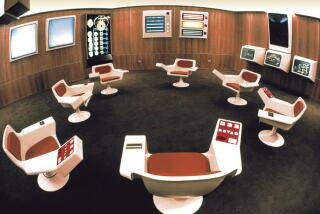Terminal Illness in Sovietland
- Share via
The Kremlin has a problem. The Soviet Union cannot allow itself to be left hopelessly behind in the computer revolution that is sweeping the world. But Communist rulers break into a cold sweat at the thought of giving millions of Soviet citizens access to computerized information banks.
The question is how many bytes the Kremlin thinks that it can take before the computer gnaws holes in the country’s internal walls of secrecy.
The world economy is being revolutionized by computers, which are being used for everything from payroll accounting to the control of robots on production lines. The accuracy of missile-guidance systems depends on the speed and reliability of the microprocessors that are on board. Through personal word processors millions of people in the non-communist world have direct access to a quantity and variety of information that was undreamed of just a few years ago.
The Soviet Union has been using computers in its military and space programs for a long time, but has lagged way behind the West in industrial production and management applications. Concern over this state of affairs has recently turned to alarm--and to public recognition that something simply must be done about the mass education of Soviet young people for the computer age.
The alarm is not limited to civilian educators or economic planners. Much of the impetus for computer education is coming from the Soviet military, which worries about the ability of future service personnel to operate sophisticated weapons.
At present, Soviet elementary and high schools provide no training in computers, and home computers of the sort that have become common in the United States and other Western nations are virtually non-existent.
Starting next year, however, the schools will begin receiving small computers--called Agats--for computer education. When in full gear, the program is expected to turn out 1 million students per year who will be prepared to work with computers. However, that stage won’t be reached until late in the 1990s.
One problem is the shortage of trained teachers and appropriate computers and word processors. But an even greater barrier is the ideological aversion to genuinely personal computers.
Almost any computer enthusiast in this country will tell you that the availability of a home computer leads to a mind-broadening attitude of exploration and experimentation. But the determination with which the Communist Party guards its monopoly of information in the Soviet system is at cross-purposes with the computer’s ability to gain access to stored data, to communicate with other computers and to act as a high-speed printing press.
Keep in mind that in the Soviet Union all printing presses are controlled by the state. Private ownership of mimeograph machines is not allowed. Even typewriters must be registered with the authorities. And information that is easily accessible in the West--economic statistics, census data and the like--is tightly controlled in the Soviet Union.
Just how the Soviet dilemma will ultimately be resolved remains to be seen. It appears, however, that home computers will still not be sold, and that students will have access to computers only under close supervision. Western observers note that in Soviet articles on the subject the term collective use of personal computers is used again and again.
The Kremlin, in short, is trying to graft computers onto a system in which all kinds of information, not just military secrets, is parceled out on a need-to-know basis. If it stays on that track, the Soviet Union will continue to play catch-up in the economic and technological competition with the West.
More to Read
Sign up for Essential California
The most important California stories and recommendations in your inbox every morning.
You may occasionally receive promotional content from the Los Angeles Times.













